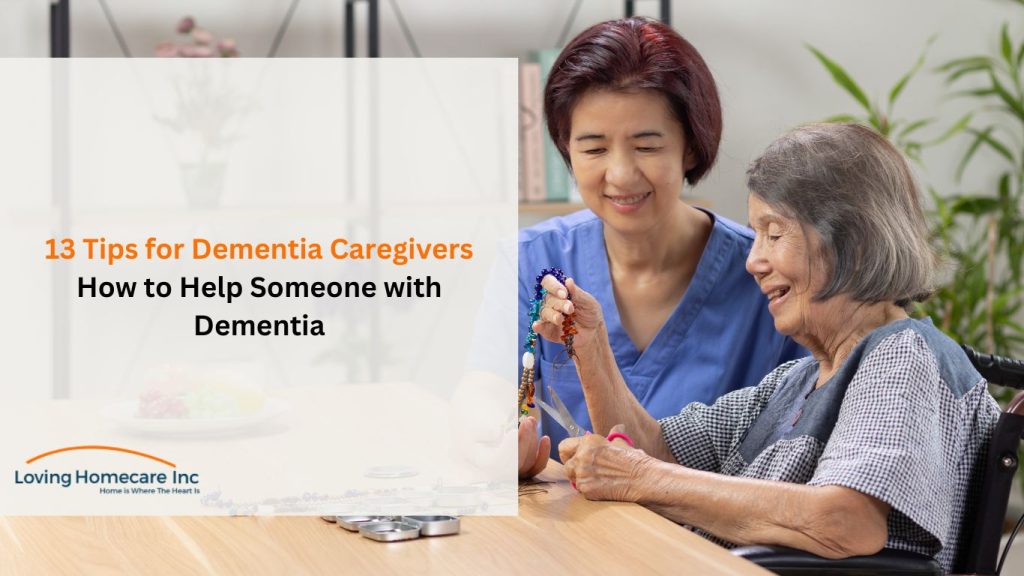Recently updated on January 8th, 2026 at 10:48 am
Navigating the Journey of Dementia Caregiving
This is an unfortunate reality that millions of people face throughout the world. More than 55 million people in the world are currently fighting with dementia. This number increases every year as more than 10 million people are diagnosed with dementia every year. As a caregiving organization, we understand your struggle and pain of seeing your loved one, who was once healthy, struggle with recalling the simplest of things. Dementia is more than just memory loss; it is a disease that affects not only the individual suffering from it but their families as well. In this article, we’re going to help make your experience a little easier and provide you with some dementia caregiving tips to support you in your journey of caregiving.
Understanding Dementia: The First Step to Caregiving
Knowledge is indeed power when it comes to tips for caregivers of dementia. As a caregiver, you need to understand dementia and how it progresses to take care of someone with dementia. The symptoms of dementia are relatively mild in the beginning, but they may worsen and become more apparent as time goes by. The symptoms include problems with memory, thinking, problem-solving, or language, and often changes in emotions, perception, or behavior. Alzheimer’s is a common cause of dementia, though it may be caused by other factors as well.
Managing Dementia: A Holistic Approach
Your approach to managing dementia should ideally include many methods. It should address the physical, emotional, and psychological needs of both the individual with dementia and their caregivers. To sum up, you should establish a safe, supportive environment, establish stable routines, and incorporate mentally and physically stimulating activities into your routine. Doing all this can reduce the rate of decline in the patient and improve the quality of life of the patient and the caregiver.
Here are some caregiver tips for dementia that can make your journey easy:
Create a Safe and Supportive Environment
Having a safe and secure environment is extremely important for both the caregiver and the patient with dementia. This is important to prevent any emergency. Individuals may experience confusion and disorientation as the disease progresses, leading to accidents.
Tips for Dementia Caregivers
Remove hazards
Secure your place by removing hazardous things from the way. Secure rugs, install handrails on stairs and in bathrooms, use anti-slip slippers, replace slippery rugs with secure rugs, childproof the cupboards, and use bright lighting to prevent any falls.
Simplify The Space
Simplify your living space by making sure your space doesn’t have unnecessary items or clutter. A decluttered space prevents unnecessary falls, minimizes confusion, and makes essential items easily accessible.
Real Life Example
Many examples show that installing railings, removing reflective surfaces, and simplifying your space can reduce unwanted falls, unwanted scares, or confusion in dementia patients.
Effective Communication Tips for Dementia Caregivers

People who have dementia might find it difficult to communicate properly. Here are some communication tips for dementia caregivers that can help you reduce stress and frustration and ensure clear communication with the patient.
Caregiver Tips for Dementia
Stay calm and patient:
Maintaining a patient and a calm attitude when dealing with a patient with dementia is extremely important. A patient with dementia may register things late and repeat things, which can be a little frustrating. However, approaching the situation with a calm and positive attitude can significantly impact the comfort and well-being of the patient. It will make them feel valued and understood, reduce their anxiety, and reduce the frustration of the caregiver as well.
Use simple sentences:
To ensure that your patient understands your directions, speak slowly and clearly. Use simple and familiar words. This will also help minimize confusion and help them process the information effectively. Make sure you break down instructions into more minor and easily understandable language. This will help you create a more accessible and supportive environment.
Avoid correcting:
When communicating with your loved ones suffering from dementia, you have to keep in mind that what they say might not always be correct. At times, they may keep repeating something. Or maybe they won’t be able to express their true feelings and needs. So, in times like these, you must be extra hands-on with them. Instead of getting agitated or correcting them, act patiently and calmly.
Real-life Example:
Research has shown that speaking slowly and in simple sentences reduces the pressure. Thus resulting in effective communication.
Routine and Structure: Keys to Stability
You may ask how a routine helps. Having a consistent routine can help develop a sense of familiarity, reduce confusion, and help you avoid frustrations or unwanted emergencies. Establishing a consistent daily routine can also provide security for individuals with dementia.
Caregiving Tips for Dementia
Regular schedules:
Try to maintain consistent timings for various routines, such as meals, other activities, and sleep. This will help your loved one understand time. A regular schedule helps reduce confusion and anxiety by providing a sense of stability and predictability. It also establishes healthy habits and improves overall well-being, making daily life more manageable.
Familiar activities:
Make sure you stick to carrying out activities that are a part of your routine and that you both enjoy. Abruptly introducing new activities will only increase confusion and anxiety in individuals who have dementia.
Visual aids:
To help your loved one remember the schedule, develop a habit of using visual aids. These can be things like calendars, post-it notes, or a schedule on the whiteboard. All of these things will help reinforce the routine that you have established.
Real-life Example:
Research has shown that having a schedule reduces anxiety and provides a sense of normalcy.
Self-Care for Caregivers: An Essential Priority
It is not just the mental and emotional well-being of the person who has significant dementia. The physical, mental, and emotional well-being of the caregiver matters equally. It is crucial that you take care of yourself and take good care of your loved ones, too. Here are some self-caretips for dementia caregivers to help them keep their well-being in check.
Tips for Dementia Caregivers:
Seek support:
Caregiving for someone with dementia can become an overwhelming task sometimes. If you feel stressed, it is better to seek help.
Engage with support networks, including online groups and structured programs like the CMS GUIDE model, which provides care navigators, respite care, and coordinated support to reduce caregiver burden and improve outcomes.
Take breaks:
Sometimes, taking a break from your caregiving journey can help you rejuvenate and recharge. When you do so, go for in-home care services to take care of your loved one with dementia so that you can help your loved one more efficiently. Loving Homecare Inc. provides excellent in-home care services to help you care for your loved one, allowing you to rest easy so your loved one is in capable hands while you rejuvenate yourself.
Stay healthy:
You must maintain a healthy routine to continue caring for your loved one. Eat a nutritious diet and engage in regular exercise to maintain your health.
Real-life Example:
Statistics show that joining a support group increases positivity. Sharing experiences with others in similar situations provided her emotional strength and practical advice.
Engage and Stimulate

Keeping the mind active and engaged is extremely important to slow down the progression of dementia. So, make sure you plan stimulating activities that your loved one suffering from dementia can engage in.
Dementia Tips for Caregivers:
Puzzles and games:
Less complex games like scrambling and puzzles can help engage the brain and reduce memory loss. It will also help your loved one spend time productively.
Art and music:
Try exploring different kinds of music and other performing or traditional arts. This will allow them to express their emotions in ways they cannot otherwise.
Physical exercise:
Taking the patient out on walks will help them develop a relationship with nature. It might become their favorite activity. It can also help them calm their nerves and boost their mood when nothing else works.
Real-life Example:
Caregivers report that engaging dementia patients with puzzles and reminiscing activities provides mental stimulation and creates joyful moments of connection. Loving Homecare Inc. can help you carry out such activities and keep your loved one active.
Nutrition and Hydration

Nutrition plays a vital role in anyone’s life. A good and balanced diet is required to maintain good health. So, one of the most important dementia tips for caregivers is ensuring that the individual with dementia receives proper nutrition. At different times, changes in appetite and eating habits can occur. Therefore, you have to prepare and plan.
Dementia Tips for Caregivers
Balanced Diet:
Make sure you plan a balanced diet for your loved one with dementia. Make sure that the diet is filled with a variety of nutrients. Include a variety of vegetables, fruits, whole grains, and lean proteins in the meals.
Small, Frequent Meals:
Divide the meal into smaller portions. This makes mealtime smaller and more manageable, ensuring your loved one receives the essential nutrients without fuss.
Hydration:
People with dementia may often forget to drink water. Encourage regular fluid intake throughout the day by offering water, herbal teas, and hydrating foods like fruits and vegetables.
Manage Behavioral Changes with Compassion
People with dementia may display certain behavioral changes, such as agitation and wandering. It is essential to understand what causes these behavioral changes in order To deal with them.
Communication Tips for Dementia Caregivers
Stay Calm:
Try to remain calm and patient when caring for a patient with dementia. Unpredictable changes in the behavior may cause frustration. However, understanding and a quiet demeanor can help reduce anxiety in your loved one.
Identify Triggers:
Patients with dementia have specific triggers that distress them. Identifying these tigers can help you avoid stressful situations. To do this, keep close attention to their environment and behavior.
Redirect Attention:
If a patient with dementia becomes agitated, gently redirecting their attention can be very helpful. Engage them in a calming activity that they enjoy, such as listening to music, looking through photo albums, or doing a simple craft.
Real-life Example:
Caregivers report that averting attention by playing soothing music or going for a short walk often helped calm the patient during agitation.
Plan for the Future: Legal and Financial Considerations
Early planning can help lessen future stress. Ensure you address the financial matters with the individual so they can participate in decision-making.
It’s also crucial to consider the financial aspects of dementia care. The total cost of dementia care in the U.S. is projected to reach $781 billion in 2025, underscoring the importance of early legal and financial planning to manage expenses and ensure sustainable, quality care for your loved one.
Tips for Dementia Caregivers
Power of Attorney
Ensure you establish a power of attorney with the patient. This authority allows you to make important decisions on their behalf that they can no longer make themselves.
Financial Planning:
It is important to plan ahead for long-term dementia care. Consult with financial advisors to help manage assets and expenses, including medical and daily living expenses.
Long-term Care:
Regarding caregiver duties and responsibilities, it is extremely important to plan long-term care. You can hire in-home care services to improve the quality of life of a dementia patient.
Building a Support Network
When it comes to caregiving for someone with dementia, having a sound support system is the key. Caregiving is a big responsibility that you should not take alone. Build a strong network of friends and family who can provide you with the necessary support and valuable assistance.
Tips for Dementia Caregivers
Delegate tasks:
Do not hesitate to ask your friends and family for help completing tasks and taking on responsibilities, which will help relieve some of your burden.
Maintain Personal Connections and Social Interaction

Personal connections and social engagement are critical to keep the patient’s and caregiver’s mental and emotional health in check. It reduces feelings of isolation, depression, and anxiety.
Caregiver Tips for Dementia:
Encourage social activities:
Make sure you maintain your own social life and also help your loved one with dementia maintain a social life. Stay connected by arranging outings with friends, visiting senior centers, or joining local clubs. Loving Homecare Inc. can also allow you to take a small break when necessary to maintain your social life.
Family involvement:
Make sure your family and loved ones keep visiting and maintain a good bond with the patient. Regular family visits may reinforce the sense of belonging for your loved one with dementia.
Real-life Example:
Caregivers have reported that taking their loved ones with dementia to weekly community center gatherings, where they could socialize and engage in light activities, provided a sense of belonging and joy for them.
Utilize Technology
We live in a modern era. The tools available today can help you perform your caregiver duties and responsibilities more efficiently, making your caregiving journey more fulfilling yet easy.
Caregiver Tips for Dementia
Apps and Tools:
Incorporate a range of technology solutions, including dementia-specific apps for medication reminders and cognitive exercises, as well as smart home devices like voice-activated assistants and automated lighting for enhanced safety and engagement. Emerging tools such as virtual reality experiences and digital photo albums can also spark memories and maintain meaningful interactions.
Safety Devices:
Utilize GPS tracking systems along with smart home safety features like fall detection and emergency response systems to create a secure environment, reducing risks and enabling quick responses to potential emergencies. Such technology provides peace of mind, ensuring quick responses to potential emergencies.
Real-Life Example: Tom and the GPS Tracker
Many caregivers used a GPS tracker for their loved one with dementia, who had a tendency to wander. The GPS tracker allowed them to swiftly locate their loved one if he strayed, offering reassurance and security for them and their loved ones.
Additionally, telehealth services are becoming increasingly vital, allowing seniors to access medical care from home with caregiver assistance. Remote patient monitoring, now widely covered by Medicaid, has seen usage rise from 13% in 2020 to 25% in 2025, enhancing continuous care and reducing the need for hospital visits.
Foster Independence Where Possible
Help foster independence by allowing your loved one to perform specific tasks. You can do this by breaking down the tasks into smaller manageable steps. You can also supervise them and provide gentle guidance if possible.
Hire Professional Help:
If you lack friends and family to build a support system, you should look into hiring professional help. Investing in in-home respite care and counseling can help you manage stress and burden. Reduce anxiety in the caregivers and give them much-needed time to reset and start afresh. Loving Homecare Inc. is one such customizable in-home care service with excellent care plans. At Loving Homecare Inc, we aim to provide top-notch care services to help you take care of your loved ones so you can rest assured that they are in capable hands.
FAQ's
Simple changes in your approach can make a difference in understanding and supporting someone with dementia. Visit Loving Homecare Inc. to ease your caregiving journey and get expert guidance and personalized care plans. Our team can help you take care of your loved ones with dementia in a safe environment.

